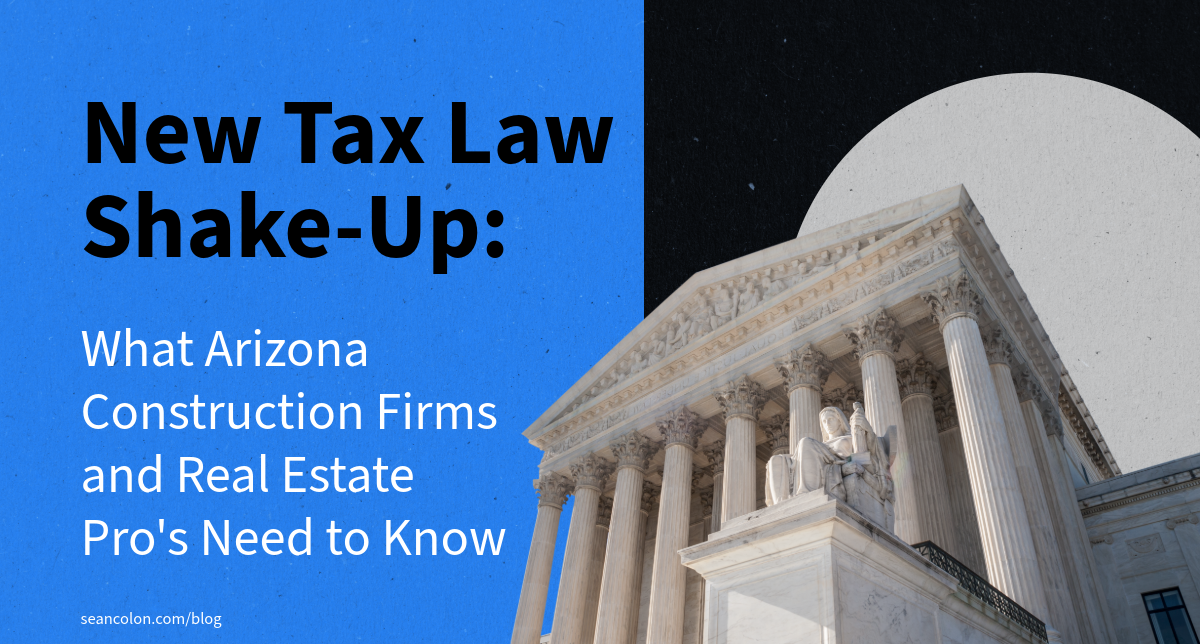New Tax Law Shake-Up: What Arizona Construction Firms and Real Estate Pro's Need to Know
By Sean Colón
The latest federal tax legislation is making waves across the construction and real estate sectors—and Arizona is no exception. With bonus depreciation back at 100%, permanent Qualified Business Income (QBI) deductions, and a major boost to the State and Local Tax (SALT) deduction cap, savvy business owners have a golden opportunity to rework their tax strategies for greater cash flow, reduced liability, and smarter long-term planning. For Arizona realtors and builders operating S Corps, LLCs, or partnerships—or advising clients who do—this breakdown will help you stay ahead in an increasingly competitive and tax-conscious market.
🔍 What’s in the New Tax Law for Arizona Construction & Real Estate Pros?
This isn't just another update. The recently passed federal tax bill reshapes major components of business taxation—particularly in construction-heavy states like Arizona, where equipment, land, and building investments are part of everyday operations. Here’s what matters most to you:
1. 100% Bonus Depreciation Is Back—And It's Here to Stay
What’s Changed:
The new law permanently restores 100% bonus depreciation for qualified property purchased and placed in service after January 19, 2025. Under the old Tax Cuts and Jobs Act (TCJA), this full deduction was being phased out—set to drop to just 60% by 2025.
Why It Matters in Arizona:
From Scottsdale to Queen Creek, fast-growing construction firms are buying trucks, heavy machinery, staging assets, and even upgrading office facilities. With full expensing restored, you can write off the entire cost of qualifying equipment and improvements in the year they’re put to work.
Pro Tip for Builders & Realtors:
Time your purchases strategically. This law favors companies ready to make major investments in 2025 or beyond. Planning to refresh your staging gear, camera equipment, or office systems? This is your moment.
✅ Action Item:
Coordinate with your CPA to time capital purchases and ensure assets are placed in service after January 19, 2025. Bonus depreciation is generally broader than Section 179 and has fewer income limitations. Learn more from the IRS Bonus Depreciation Guidance.
2. The QBI Deduction Is Now Permanent—Are You Taking Full Advantage?
What It Is:
Section 199A, better known as the Qualified Business Income (QBI) deduction, allows owners of S Corps, partnerships, and sole proprietorships to deduct up to 20% of business income on their personal returns. Now, it’s permanent.
Arizona Application:
Construction companies, real estate brokerages, and development firms structured as pass-through entities can lock in a lower effective tax rate—especially beneficial in high-margin years.
But There’s a Catch:
Full deduction is only available for those earning below $197,300 (single) or $394,600 (married).
Above that, a phase-in applies, with caps tied to W-2 wages paid and qualified property owned.
Realtors Take Note:
If you run your own real estate firm or advise investor clients, this is the time to re-evaluate compensation structures, salary distributions, and asset ownership. LLCs and S Corps must optimize for both wage-based limits and property calculations to maximize deductions.
✅ Action Item:
Review your business structure and how you pay yourself. If your taxable income is nearing the threshold, small changes in salary or entity structure could mean big savings. Learn more about IRS QBI deduction rules here.
3. The SALT Deduction Cap is Up—Way Up
What’s Changed:
The federal cap on State and Local Tax (SALT) deductions has jumped from $10,000 to $40,000, indexed for inflation, through 2029. It reverts in 2030.
Why Arizona Builders & Investors Should Care:
Companies operating in high-tax municipalities like Tempe or doing multi-state business have long run into the old SALT cap. The new cap opens new planning opportunities—especially for partners in pass-through entities.
Switch or Stay?
Some companies have used Pass-Through Entity (PTE) tax workarounds, allowing the business to pay state taxes directly. With a higher SALT cap now available on individual returns, it may be time to reevaluate.
✅ Action Item:
Run the numbers both ways:
Claiming the higher deduction on Schedule A
Sticking with entity-level PTE payments
Arizona’s tax credit and reporting systems may influence the best choice. Your CPA can model which option is best based on your income and filing structure. Review the Arizona Department of Revenue PTE resources for current guidance.
🧾 Wrap-Up: What Arizona Construction Leaders and Realtors Should Do Next
The new tax law isn't just about numbers—it’s about positioning your business for sustainable success. With major deductions available for capital investment, streamlined pass-through income tax relief, and more flexibility on SALT deductions, the smartest professionals in Arizona real estate will use this moment to sharpen their financial edge.
🔧 What You Should Do Now:
Plan large equipment purchases with bonus depreciation in mind
Evaluate your business structure to optimize QBI
Reassess SALT strategy to capitalize on the new deduction limit
Work with a CPA familiar with Arizona construction and real estate tax strategy
Arizona builders and realtors who act early will gain a leg up—not just on taxes, but on profitability, scalability, and investor confidence.
Need Help Showcasing Your Projects or Listings?
If you're making major capital improvements or upgrading properties, professional photography and virtual staging can maximize your ROI. Reach out here to elevate your listings and reflect your firm’s commitment to quality and detail.
By the way, I help realtors improve their online and social media presence by providing beautiful photos of their listings. That is why I’ve created this FREE HOME PREP LIST for your clients to help your listings look their best. Feel free to share.

